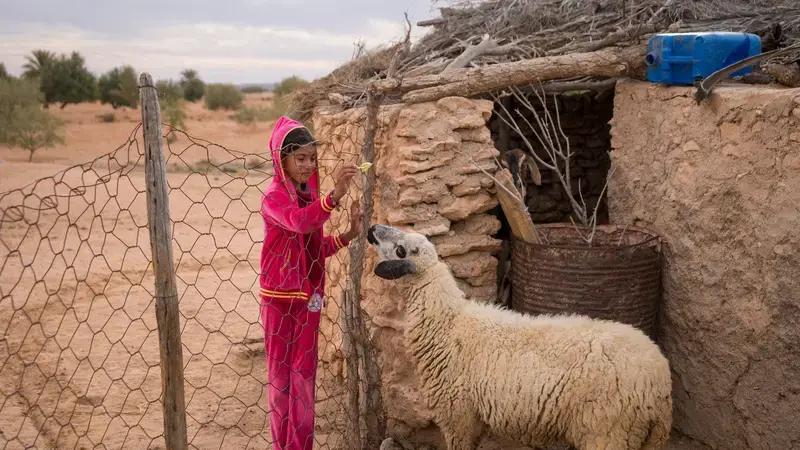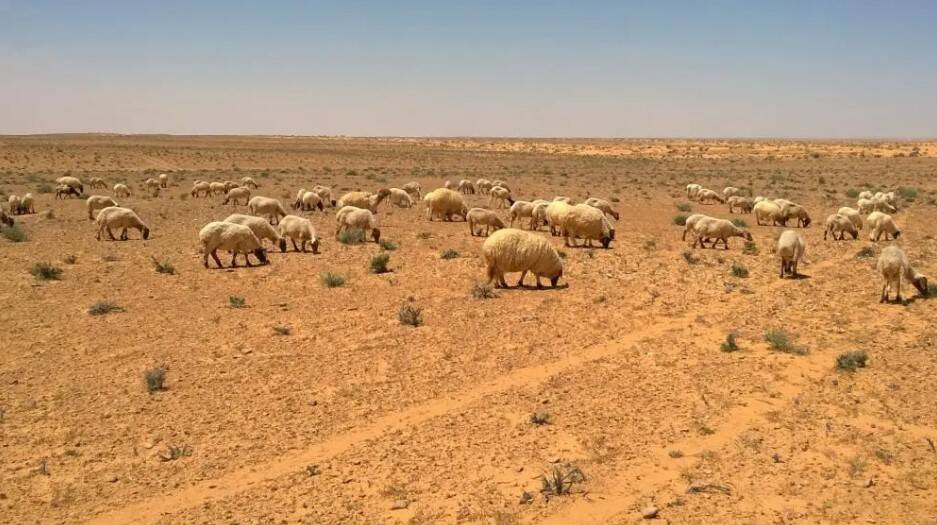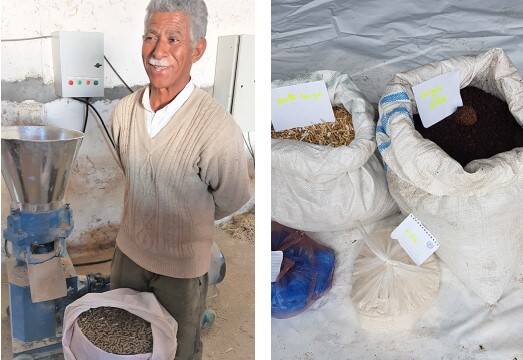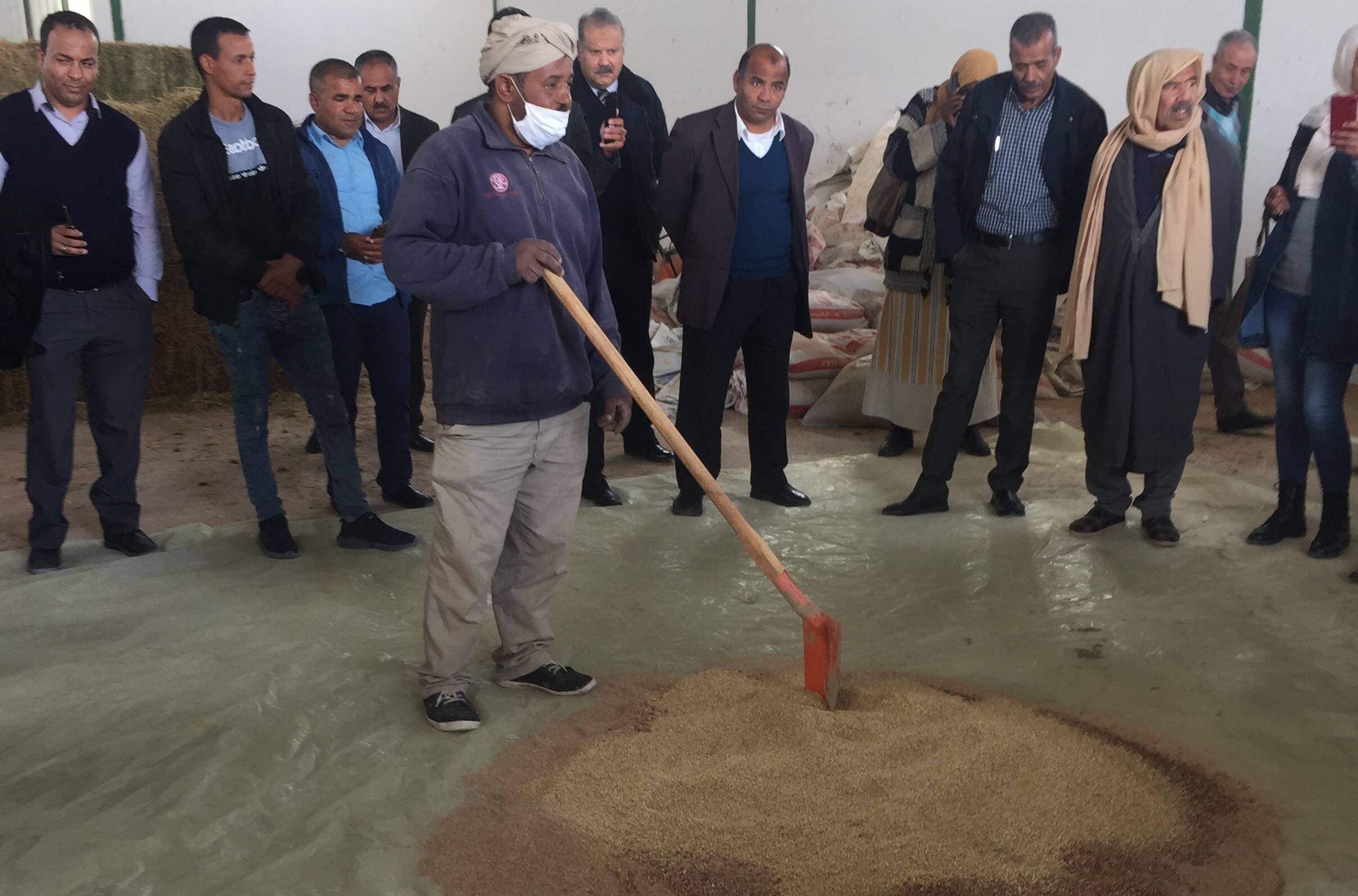The food pellets restoring degraded rangelands in Tunisia

By Dr. Aymen Freija, ICARDA Senior Scientist and Agricultural Economist, and Mr. Udo Rudiger, Agricultural Innovation Specialist at ICARDA.
- More feed, less rain
For decades, farmers in Southern Tunisia have struggled to obtain sufficient animal feed for their goats, sheep, and cows. Accessing feed is especially challenging in the summer months and in times when rangelands are officially designated fallow and off-limits by the government to allow regeneration from grazing.
The region has little rainfall, so crops, including the ones grown to feed animals, are not produced in sufficient quantities. Instead, livestock production and pastoralism are the two main income-generating activities supporting smallholder family farmers' livelihoods and food security in the region.
Due to low feed supplies, animals graze on rangelands which can degrade this ecosystem’s biodiversity and health if uninterrupted.

ICARDA and the CGIAR Research Program on Livestock (CRP Livestock) are solving the issue while protecting the environment through food pellet machines that boost production of animal feed and use readily available farming by-products.
In the arid south of Tunisia, this work supported the research of the CGIAR Research Program on Policies, Institutions, and Markets to enhance rangeland governance and stimulate collective actions for rangeland restoration.
- One farmer’s waste is a pastoralist’s treasure
Olive residues and cactus peels, usually discarded, become cost-free, nutritious feed pellets for goats, sheep, and cows once fed to the machine. Other by-products such as date residues, wheat bran, and legumes mixed with urea (important for animal metabolism), mineral, and vitamin supplements, are often added.
In terms of cost and nutrition, the pellets compete favorably with imported pellets and feed concentrates, and offer a supplement to grass, hay, or straw, all high in protein and energy.

A recent study conducted by the CGIAR Research Program on Policies, Institutions, and Markets and ICARDA shows that to better govern and protect rangelands, farmers need to enact economic diversification and improve the institutional capacity of their associations.
It is also recommended that farmers self-process animal feed to support pastoralists. Another study showed that unified action between the various beneficiaries is key to successful rangeland restoration programs.
CRP Livestock has invested in technology development and promoted feed value chains across Tunisia for over five years, resulting in the sale of forty pellet machines in Tunisia, three of which were given to farming cooperatives to supply farmer networks.
ICARDA and its national partner 'L'Office de l'Elevage et des Paturâges' (OEP) also developed guides to best feed ratios and selected the most suitable farmers' cooperatives to kick-start pellet production in the country.
- From theory to practice: Training in Kebili
To reduce pressures on rangelands and livestock farmers, ICARDA and its national partner OEP collaborated with 'L'Institut des Régions Arides de Médenine' (IRA) to organize a one-day training to explore alternative feed approaches.
Ten farmers representing four regional farming associations, 80 representatives from various Tunisian organizations, and ICARDA's national partners attended and examined the potential of more animal feed value chains based on locally available agricultural residues, raw materials, and machinery.
The training day also presented up-to-date scientific research on feed rations, feed processing, and animal performance, and the local farmers' association El-Marai demonstrated the processing of date residues, bran, dry Luzern, barley grain, faba bean, and minerals into feed pellets.

According to Mr. Hedi Benhamiden, who coordinates El-Marai, 20 farmers have used the pellet machine since it arrived two months ago. They fed the machine local agricultural by-products and residues with very encouraging results. "The feeding value we've obtained is comparable to imported concentrates but much cheaper!" he said.
The training also highlighted the ongoing efforts of the Tunisian government’s rangelands' resting program which provides farmers with feed substitutes such as concentrates. However, the program is ending, and farmers are likely to resume rangeland grazing if other affordable, high-quality feed sources are not found soon.
Aside from relieving grazing pressure on rangelands, using agricultural by-products for livestock feed is beneficial to the environment, for example by ridding date palm plantations of date residues that contaminate palm trees. It also produces feed 20 percent cheaper than imported concentrates, a supply that is also volatile.
According to Mr. Hedi Benhamiden, the demand for El Marai's 50-kilo bags of "YouFeed" food pellets is high. But to transform this activity into a genuine business venture, two core elements are missing: a feed mixer and a drying facility.
"Having those would create a complete production chain, that would compete with commercial feed suppliers for the benefit of farmers, both those producing and those consuming" he explained. It can also create jobs for women and youth, a vastly underused resource in the region.
ICARDA, through the CGIAR Research Program on Policies, Institutions, and Markets' engagement, is now facilitating a public-private partnership for the associations involved to further develop the venture. ICARDA's and IRA will continue to support farmers' associations after the CGIAR Research Program on Policies, Institutions, and Markets and CRP Livestock projects wrap up.
-------------------------------------------
ICARDA’s work on food pellets is supported by many projects including CRP Livestock, the Viability project (French-CGIAR partnership), and the CLCA-project funded by the International Fund for Agricultural Development (IFAD). ICARDA’s work on rangeland governance and scaling of successful rangeland restoration programs was further supported by the CGIAR Research Program on Policies, Institutions, and Markets. All these projects and activities were completed in collaboration with 'L'Office de l'Elevage et des Paturâges' (OEP) and 'L’Institut des Régions Arides de Médenine' (IRA).
